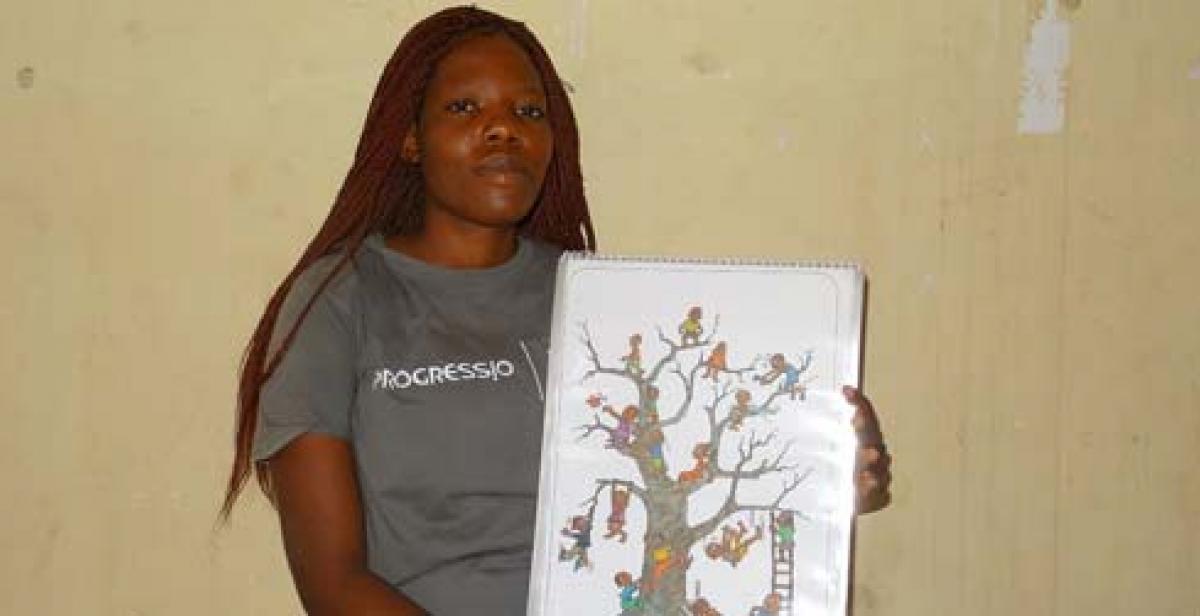On 1 March it was Zero Discrimination day. On 28 February, we decided to visit Teen Club, who meet at the Chikhwawa District Hospital ART clinic every month. Teen Club is a group of children living with HIV and AIDS and are already taking ARVs (anti-retroviral drugs). The reason we visited Teen Club is because we wanted to talk about child therapy. In terms of HIV and AIDS, child therapy includes psychological, health, social and medical support. It also involves a technique called, progressive disclosure. This is a method where children are told about their status and ARVs in stages using pictures. The level of disclosure is usually determined by the child’s age and the depth of the questions that they are asking.
The clinic that supports Teen Club is potentially going to close because the funding has stopped. About 200 young people, aged 10 to 18, used to meet once a month to learn about the virus and how to take their ARVs properly, and to play games and sing songs. They are also taught not to have unprotected sexual relationships. Now there are just under 50 young people meeting at Teen Club each month. This is because they are not getting support in terms of transport because they are coming from different areas. They used to receive food but because of the lack of funds the hospital is no longer able to provide refreshments. So now there is less incentive for these children to come.
When we arrived the children welcomed us by singing a song with dance moves. At first we were just following what they were doing but then we joined in properly. The club leader introduced us to the children and then Esnat, our field officer, introduced us and explained why we were visiting them. We then started sharing what we had brought.
Esnat is very knowledgeable in the area of child therapy. She talked stage by stage to find out how much the children knew about why they were taking ARVs. The responses showed they were already aware of their status. Esnat continued with the topic by emphasising the importance of taking ARVs at the right time every day. If people who are living with HIV do not take their ARVs at the right time, they can build up a resistance to the drugs, which can be very dangerous. Esnat also talked about healthy eating because some children seemed to be lacking in nutrition. Esnat spoke to the children about discrimination. Although, in a group, they might not have felt comfortable to disclose any issues of discrimination, Esnat invited them to come and visit her should they face any challenges in this area.
Over the past few weeks we have meet with students in some schools around Chikhwawa. While on these visits we heard from the schools and community that early marriages and pregnancies is a big problem. Therefore I took the initiative to give a talk on the problems surrounding these issues, for example, high population, poverty and health risks. Jonnex, our national team leader, talked about the positive and negative effects of peer pressure and the importance of staying in school.
The children ended our day singing good music for us and we played some games with them. We also managed to bring some Maheu, which is a non-alcoholic sweet beer (a local drink here in Malawi), for the children to drink. The members of staff at the hospital urged Esnat to keep coming to support the children further.
Following on from our visit to the Teen Club, Esnat gave us a learning workshop on child therapy. She used professional cards with photos and talked us through the process of telling a child they are living with HIV and AIDS. We learnt about the three stages of disclosure; fully disclosed, partially disclosed and no disclosure. The workshop was very informative and we are hoping to use the information we have learnt to teach fifteen care givers how to pass on this information to their children who are living with HIV and AIDS.
Written by ICS volunteer Gloria Manjomo
Photography: Amy Stops



